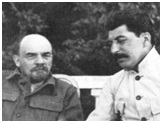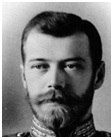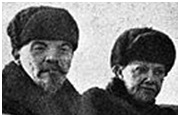|
 |
|
 |
|
|
||
Lenin Leadership
Lenin (1870-1924)
Born Vladimir Ulyanov in Russia, he (pictured right) successfully led the Russian Revolution in 1917 which overthrew Tsar Nicholas II. Introduced a communist dictatorship with the help of the Red Army after in 1920 defeating the more moderate, White Army, in a civil war.
Why was he so influential?
1. Purpose and ideology He was determined to overthrow the dictatorship of the Tsar and introduce communism, particularly after his eldest brother, Alexander, was hanged for the attempted assassination of Tsar Alexander III (pictured right) in 1887. To win the people's support before the Revolution, he coined a simple slogan to sum up what they wanted: "Peace, Land, Bread". On winning the Revolution, his aims were: a) Soviet power (i.e. government by dictatorship). b) the electrification of Russia (re-named the Soviet Union). c) modernising industry and agriculture (most Russians were peasant farmers). 2. Learning Unlike his successor Joseph Stalin (pictured right together in 1922), he was extremely well educated, a lawyer, scholar and voracious reader from childhood, when the story of slavery in Uncle Tom’s Cabin greatly influenced him. His great hero was Karl
Marx (pictured right below), who supported the overthrow of capitalism through a
revolution by the working class.
3. Fear, oppression and cruelty Fear and force kept him in power, despite a disastrous economy and bad planning. Helped by the army and secret police, which he formed, he killed or sent to labour camps millions of
people, stealing food from starving peasants. He immediately crushed any opposition, including in 1921 a revolt by some sailors in the navy. After the revolution in 1917 and the overthrow of Tsar Nicholas II (pictured right), Russia had its first ever democratic election, which rejected Lenin’s party, the Bolsheviks. But he seized power by force and replaced democracy with a dictatorship. He terrorized people so they wouldn’t oppose him. “Catch a hundred kulaks [rich peasants] and priests and hang them”, he wrote to the Communist party in the city of Penza in 1918.
4. Machiavellian He was a big supporter of Machiavelli (pictured right), and his idea that the means (i.e. murder and terror) justified the end (communism). “Everything that promotes the success of the revolution is moral; everything that hinders it is immoral”, Lenin said.
5. Hard work, single-mindedness and self-discipline He worked relentlessly 16 hours a day (despite his continual blinding headaches and
insomnia) He sacrificed his family, friends and favourite pastimes, chess and music, particularly Beethoven (pictured right) He was a spoilt child, who exploded if he did not get his way, and was obsessive about tidiness and routine, exercising regularly.
6. Support of his party He had great respect within his Bolshevik party and the skill to portray as revolutionary more moderate policies like his New Economic Policy of 1921, which introduced more capitalism. 7. Support His wife, Nadezhda (pictured together right in 1919), French lover, Inessa Armand (pictured right below in 1916), and two sisters, Anna and Maria, gave him the emotional support and self-confidence, without which he wouldn’t have become a great leader.
8. Luck and opportunity He was helped by the stupidity of Tsar Nicholas’s government, and, in particular, the the First World War, which:
Key quote on leadership A lie told often enough becomes the truth.
Key quotes on economics The way to crush the bourgeoisie is to ground them between the millstones of taxation and inflation. The best way to destroy the capitalist system is to debauch the currency.
Key quote on decision making To delay action is the same as death.
Key quote on women When women have full rights, they still remain fatally downtrodden because all housework is left to them.
Key quotes on politics and government There are no morals in politics. Fascism is capitalism in decay. Actual freedom and equality will exist only in the order established by the Communists, in which it will be impossible to become rich at the expense of another.
Key quote on freedom Liberty is precious – so precious that it must be rationed.
Key quote on workers and unions In its struggle for power the proletariat [i.e. the workers] has no other weapon but organization.
|
|
|
||
|
|
||
| Copyright © wisdomtowin.com 2025 All Rights Reserved | ||
|











